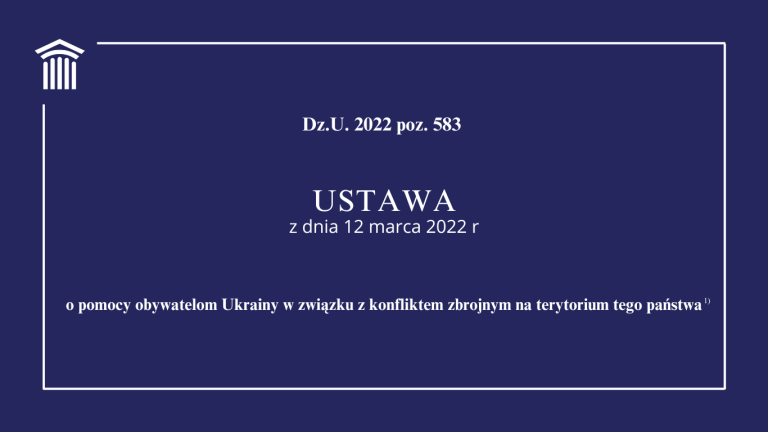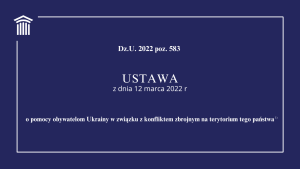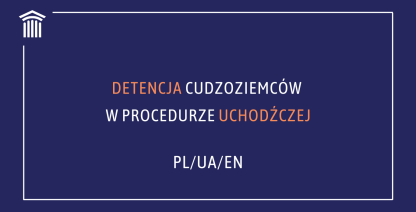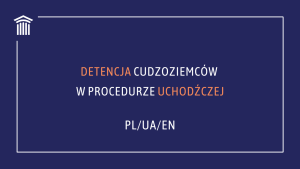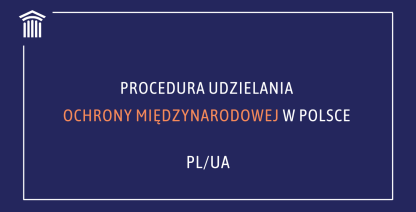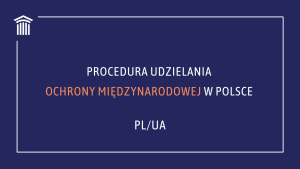In connection with the ongoing work at the Ministry of Internal Affairs and Administration on amending the Act of 12 March 2022 on Assistance to Ukrainian Citizens in Connection with the Armed Conflict on the Territory of That Country, the Rule of Law Institute has joined this process and sent its practical suggestions and proposals for amending the provisions of the Act. We encourage you to read through these proposed changes below:
Art. 4 paragraph. 11: "The municipal body confirms the identity on the basis of a valid travel document or another document with a photograph enabling the establishment of identity and enters the data into the PESEL register."
● there are still situations when Ukrainian citizens (primarily those fleeing the war in Ukraine for the first time from temporarily occupied territories) arrive in Poland without a valid travel document. It seems reasonable to restore the legal system in which it is possible to issue a PESEL number with the status 'UKR' on the basis of a document other than a travel document. The provision of art. 4 sec. 13a should be left unchanged - as soon as a Ukrainian citizen obtains a travel document (through the Embassy/Consulate or DP 'Document'), they will be obliged to add the data in the PESEL register.
Art. 26 paragraph 1 - add a subparagraph 7) as follows:
7) support benefit referred to in the Act of 7 July 2023 on support benefits.
● since people with a UKR PESEL are entitled to receive care benefits, and the support benefit is a kind of substitute for care benefits after reaching the age of maturity, it would seem reasonable to add people using temporary protection (UKR PESEL) to the group of people who are also entitled to support benefits (after meeting the statutory conditions).
Art. 12 paragraph 17d - add a sub paragraph 3) as follows:
3) minors for whom a temporary guardian has been appointed from among the persons referred to in Article 12 paragraph 17c.
● it seems reasonable that the exemption from fees for staying in an OZZ should also cover children who have a temporary guardian in the form of a person mentioned in art. 12 paragraph. 17c even if the child is receiving childcare benefits. Paragraph 17c lists a catalog of people in a particularly difficult life situation (age, disability, etc.), hence it would seem justified to introduce the mentioned solution.
Art. 42 par. 3a; art. 42 par. 5a; art. 42 par. 6; art. 42 par. 7; art. 42 par. 8; art. 42 par. 11; art. 42 par. 12a; art. 42a par. 1; art. 42b etc. replace the words "September 30, 2025" with "March 4, 2026".
● due to the extension of temporary protection "at EU level", it is justified to introduce the above change in individual parts of the Act.
Art. 10 - it would seem reasonable to introduce a solution consisting of entering information on the appointment of a temporary guardian into the PESEL register in accordance with Art. 25 of the Act, and consequently providing the temporary guardian with the possibility of downloading the DIIA.PL electronic document for a child under the age of 13 under their care.
Art. 42m. add a point 3) with the following wording: "an annotation on the residence card saying "Previously holder of temporary protection" produces the same legal effects as the annotation "Access to the labour market"
● the introduction of the above provision seems justified in order to avoid unnecessary doubts of the relevant authorities (ZUS, MOPR, etc.) as to whether the holders of the so-called "CUKR residence card" are entitled to all kinds of benefits. In accordance with the established practice and legal doctrine, the right to benefits is granted together with the right of access to the labour market (and not from the fact of placing the annotation "access to the labour market" on the residence card). The right of access to the labour market of the holders of the 'CUKR' card is indisputable and results directly from art. 42v of the Act, nevertheless, practice shows that foreigners who have a residence card without the annotation "access to the labour market" (or a residence card with a different annotation) are often forced to prove to the relevant authorities for months that specific benefits are benefits that they are entitled to.
We encourage you to monitor the upcoming changes to the Special Act, and as soon as they come into force, we will analyse them in detail and discuss the key changes.
